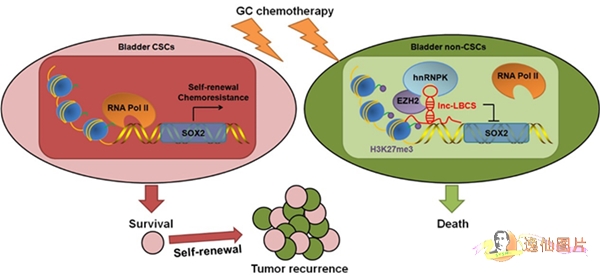New Discovery by Tianxin LIN Research Team Published in Clinical Cancer Research
Encouraging news came to Sun Yat-sen Memorial Hospital of Sun Yat-sen University recently when a research article named “Long noncoding RNA LBCS inhibits self-renewal and chemoresistance of bladder cancer stem cells through epigenetic silencing of SOX2”was published online in the journal of Clinical Cancer Research(IF 2017=10.19).This great result,achieved by an outstanding research team led by Prof.Tianxin LIN,has revealed a key molecular mechanism of chemoresistance in bladder cancer.The article is co-first authored by Dr.Xu CHEN,Dr.Rui hui XIE and Dr.Peng GU and corresponding authored by Prof.Tianxin LIN and Prof.Jian HUANG.
The study was conducted under the circumstances that bladder cancer is acclaimed as one of the most common and lethal malignancies with a high rate of recurrence and tumor heterogeneity in China.Chemotherapy is a significant component of current first-line treatment for bladder cancer,which can reduce tumor size in most patients initially.However,after multiple treatment cycles,a majority of patients progressively become unresponsive and then ultimately suffer tumor relapse.Recent studies demonstrate that the main cause of chemoresistance is existence of cancer stem cells (CSCs), which have a survival advantage in response to chemotherapy.Therefore,CSCs are responsible for the initiation,propagation,metastasis,chemoresistance and relapse of cancers.Given the critical role of CSCs in tumorigenesis,intervention to block CSCs self-renewal could be a potential strategy for tumor treatment.But as of now,the biological characters and molecular mechanisms of chemotherapy-induced BCSCs still remain largely unknown.
Through transcriptome microarrayanalysis, the study discovers a novel lncRNA.Termed lnc-LBCS is significantly downregulated in BCSCs and cancer tissues and correlates with tumor grade, chemotherapy response and prognosis.Moreover,lnc-LBCS markedly inhibits self-renewal, chemoresistance and tumor initiation of BCSCs both in vitro and in vivo. Mechanistically, lnc-LBCS directly binds to hnRNPK and EZH2, and serves as a scaffold to induce the formation of this complex to repress SOX2 transcription via mediating histone H3 lysine 27 tri-methylation (H3K27me3). Therefore SOX2 plays a crucial role in self-renewal and chemoresistance of BCSCs, and correlates with the clinical severity and prognosis of bladder cancer patients.

This study is the first to have elucidated that lncRNA-LBCS plays an important role as a tumor suppressor gene in self-renewal of bladder cancer stem cells and chemoresistance.And the regulation of lncRNA-LBCS also contributes to weak tumorigenesis and enhanced chemosensitivity. It is expected that the novel findings --the lnc-LBCS-hnRNPK-EZH2-SOX2 regulatory axismay will represent a therapeutic target for clinical intervention inchemoresistant bladder cancer.The bran-new result has provided a new perspective for the study of targeted treatment of bladder cancer stem cells and chemosensitivity improvement of the tumor cells.
The research attributes its success to the support funding of projects of NSFC(including the Distinguished Young Scholar Project,the General Program and the Youth Project),the Guangdong Natural Science Foundation and the Guangzhou Science and Technology Project,etc.
Read the full-text online article and more details on:http://clincancerres.aacrjournals.org/content/early/2018/11/09/1078-0432.CCR-18-1656
Written by:the Department of Urology and the Office of International Affairs
Edited by: the Office of International Affairs


